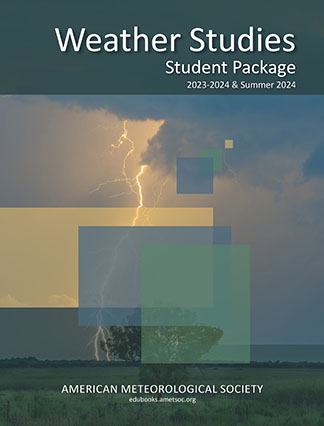
AMS Weather Studies is an introductory college-level course developed by the American Meteorological Society for implementation at undergraduate institutions nationwide.
Prepared by meteorologists nationally recognized in atmospheric science education, AMS Weather Studies places students in a dynamic educational environment where they investigate the atmosphere using real-world current environmental data. Development for this course was supported, in part, by the National Science Foundation.
AMS Weather Studies covers the composition and structure of the atmosphere; the flows of energy to, from, and through the atmosphere; and the resulting motions produced from small to planetary scales. The physical principles of atmospheric phenomena are stressed in the understanding of weather’s impact on humans, particularly with severe weather. Methods of analysis are developed through the study of current weather as meteorological data are delivered via the Internet.
Students are introduced to Earth's atmosphere and the dynamic world of weather
- as it happens, by working with current meteorological data delivered via the Internet and coordinated with Current Weather Studies investigations keyed to the day's weather, and
- via examination of real-world case studies delivered in electronic form.
Collegial assistance from AMS staff and other course users is available to new instructors.
How can the course be implemented?
- As a NEW institutional course offering
- To REVISE an existing course at your institution
- To EXPAND an existing course by adding a laboratory component
- As the FOCUS of an online course or as individual directed study
Who can offer the course?
AMS Weather Studies can be offered by experienced science faculty or those new to teaching meteorology. During course implementation and instruction, collegial assistance is available from faculty members who already offer AMS Weather Studies.
We have large numbers of atmospheric scientists, geographers, geologists, and physicists successfully offering the course, as well from disciplines such as engineering and chemistry. AMS science educators will answer any questions on all aspects of course delivery and content. This course enables you to expand and/or update your curriculum and join the ranks of colleagues teaching with the latest technology.
What are the course components?
Textbook
The full-color, 15-chapter Weather Studies: Introduction to Atmospheric Science textbook covers the basic understandings of meteorology. The textbook contains 10 Review and 10 Critical Thinking Questions per chapter.
Manual
The investigations are coordinated with the textbook chapters, each investigation (two per week) with an Introduction and Applications section. They lead the student through analysis and interpretation of real-world weather.
RealTime Weather Portal
The AMS RealTime Weather Portal includes the delivery of Current Weather Studies, Math Skills, Critical Thinking and Diversity, current weather maps, visible, infrared, and water vapor satellite imagery, composite radar displays, and surface and upper-air data, plus forecast maps for the United States and southern Canada. Meteorological data, formatted and delivered via NOAA's National Centers for Environmental Prediction (NCEP), are updated hourly, 24 hours a day, and seven days a week, year-round.
Current Weather Studies
Challenging lab activities with real-time excitement delivered on the RealTime Weather Portal. Posted each Monday, Current Weather Studies investigations expand on important concepts using current or recent weather data.
Faculty Resources
Available on the faculty website, the Faculty Resources include the faculty guide, PowerPoints, textbook images, manual questions, textbook chapter questions, as well as chapter progress and test bank, all compatible with learning management systems.
When are the real-time course components delivered?
The real-world case studies in the Applications section of the Investigations Manual allow the combination of manual and textbook to function as a full course. If offering the course during fall and spring semesters, you can the Current Weather Studies, posted on the RealTime Weather Portal, to expand on important concepts using current or recent weather data.
Current Weather Studies are posted on a weekly schedule each Monday around 12 pm Eastern Time and then archived on the RealTime Weather Portal as the semester progresses. Designed for use at any point during the course, Chapters 13, 14, and 15 are independent and the corresponding CWS are available on 15 August. Answer keys and Respondus-compatible files will be posted to the faculty website when the activity is.
View the real-time course delivery schedule.
How do I integrate this course with my Learning Management System?
The questions and answers can be ported into your learning management system for automated scoring and immediate student feedback. This feature allows for full integration into an e-learning environment. We provide learning management system-compatible files in Respondus format, software for which many campuses are licensed.
Visit Learning Management System Integration to learn about the easy three-step process for porting our files into your system.
How do I host this course at my college?
If you would like to use the entire AMS Weather Studies course package, which includes the textbook, manual, and instructor access to the RealTime Weather Portal and Faculty Website, submit a Course License to the AMS Education Program. The Course License fee (from 15 August to 14 August) is $149 per institution, regardless of number of sections or number of students.
Visit Licensing to learn more.
What are the benefits of licensing AMS Weather Studies?
- AMS Weather Studies full course use for academic year
- Textbook, Manual, and RealTime Weather Portal
- AMS Weather Studies Faculty Website and Faculty Resource Material
- Files compatible with Learning Management Systems
If you have any additional questions or concerns, please contact us at [email protected] or 1-800-824-0405.